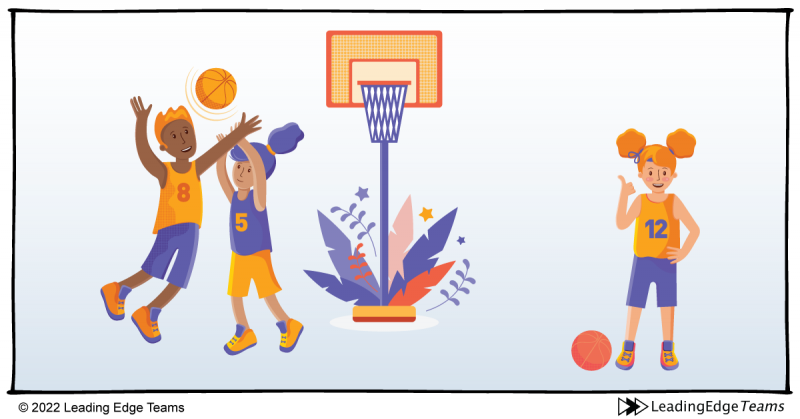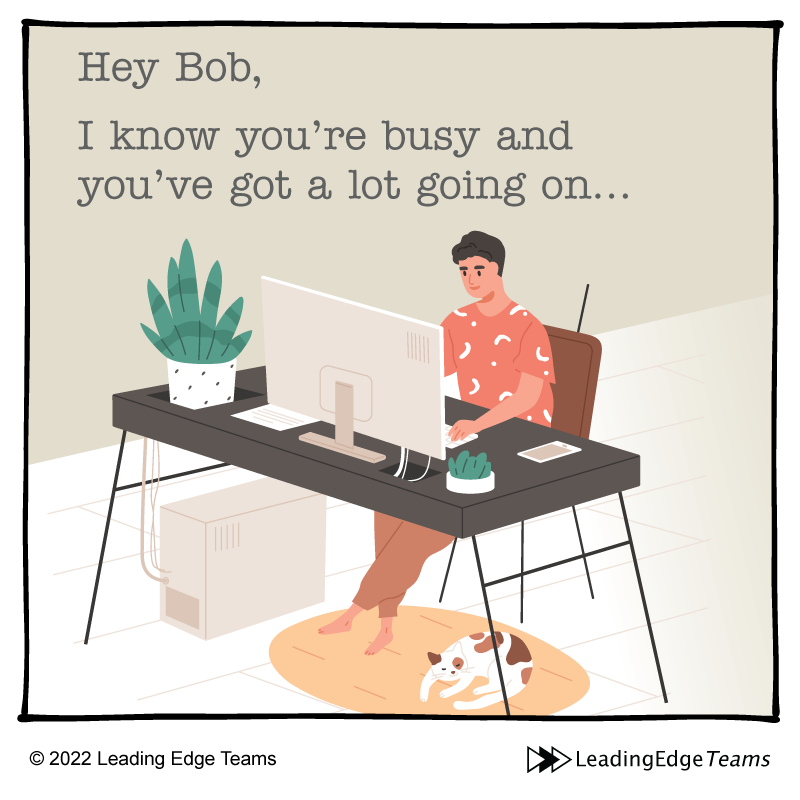As you move forward on your journey from A to V, the range of what I call “acceptable behaviors” narrows. The whole team’s performance needs to improve, to become more masterful and professional, from the CEO to the leaders to the individual contributors. Leveling up as you move forward is imperative.
Business & Sports
Because business and sports really do have a lot in common, I often use my stepson’s basketball journey to illustrate this point.

In elementary school, Justin, my stepson, was the best player on his community basketball team. He had fantastic eye-hand coordination and was great at scoring points. Being so young, all that was expected of him was to show up for games, get the ball, dribble toward the correct basket, and shoot. The finer points of the game, such as positioning and strategy, didn’t matter. Justin made loose plays and hogged the ball every now and then, but his wonderful natural ability carried him and the team to winning many games.
By middle school, Justin was in a local youth basketball league and more was expected of him. He had to learn positions and pass the ball—a LOT. He had to attend practice twice a week, learn fundamental strategies, and make multistep plays that involved other players. His coach made them do some running and skill drills to increase their ability and stamina.
Increased Expectations
In high school, he joined the freshman team, attending practice three to four days a week and regularly working out to build his strength. Then he moved to the varsity team, where he was practicing every day, including the weekends before the season started. Justin had also grown quite tall and was required to play a defensive position instead of being a player who took lots of shots at the basket. Varsity basketball is an enormous commitment for a high schooler, and before his senior year, Justin reevaluated whether he was up for it. He decided that he’d rather take all that time and energy and apply it to his studies to better ensure his place at a college of his choice, especially since he wasn’t a candidate to play college basketball.
If he had gone on to college ball, he would’ve faced even higher expectations that required an even bigger commitment, as he would have competed against and played with only the most talented players who had continued on from high school. Some of those players, those who aspired to go pro, would be making basketball their main focus and relegating their studies to just getting by.
For players who do go pro, the performance expectations are so extreme that their daily lives revolve entirely around their sport. Trainers, physical therapists, dieticians, sleep specialists, and others give specific guidance that must be followed. As the level of commitment and performance keep increasing, the range of acceptable behaviors (even outside of the game) continues to narrow. Professional basketball players don’t question the requirements because they know full well what it takes to succeed in pro leagues.
Best Practices
The point here is not only that expectations rise as you grow and get better at what you do, but also that you typically have fewer choices about how you do it. You must do things the proven way that works best.
For example (allow me to switch sports for a moment), beginner skiers are taught how to stop by wedging their skis into the shape of a pizza slice. As an intermediate skier, I can do the more advanced parallel turns and stops, but I still use my pizza move to slow myself and regain control on a steep hill (more often than I like to admit). However, I’ve never, ever seen a professional skier use a pizza wedge to regain control while navigating a slalom course. That method won’t work at their level. If you want to be a professional skier, no more pizza wedge—you must use the best practices and techniques that deliver the best results.
Leadership Competency
Leadership and teamwork habits follow a similar development path. Most people understand this is true for skills, such as engineering or software development, but many don’t realize it’s also true for personal and interactive behaviors. Know that leadership is a competency that develops through a process of continued mastery much like sports or the performing arts. And when it comes to the skills that must become sharper as you advance in your career, what most needs to up-level is not your technique for executing specific tasks; it’s The People PartTM.

And here’s something else to know: As you grow, you won’t ever hit a spot when further improvement and development is optional. As much as you may want to stay at your, say, highschool level of play, the way you perform must keep going up—if you’re going to keep playing. Why can’t you stay steady at a certain level if you don’t have a desire to grow? Because the external environment keeps shifting and changing in ways that you must respond to. Client expectations increase, technology brings new opportunities and makes old ways obsolete, and economic factors require constant reexamination of profitability and even business viability.
No To Status Quo
Think about the products and services your company offered only two or three years ago and all the ways you marketed, distributed, and served customers. Has anything changed? Where would you be now if you had decided to stop improving and didn’t change anything in your business? What if you had just rolled along as is, sitting on the sidelines, not alert and in the game, but simply chose the status quo regardless of the circumstances?
Standing still will not stop the rest of the world from moving forward. And because the expectations of the outside world continue to rise, the pressure for continuous improvement only increases, which includes how the business operates. Team members must keep improving or they eventually find themselves out of jobs, either because they didn’t improve their own skills and performance or because the business didn’t keep up and ultimately failed.
Warmly,
Annie










